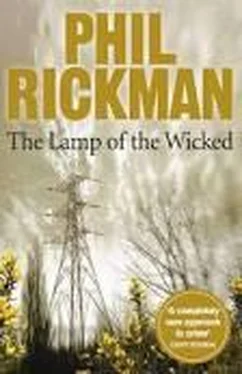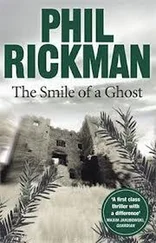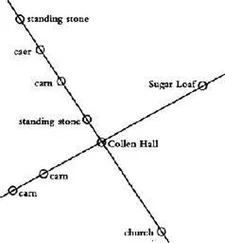‘It was switched off. Didn’t want it going off in the middle of the meeting. What’s the problem, flower?’
Jane said, ‘Gomer.’
Merrily felt her stomach tighten. ‘What’s happened?’ She’d been half expecting Gomer at the meeting: the only parishioner you could always count on for support against the village establishment.
‘It’s awf—’ The kid was still struggling for breath. ‘Awful.’
‘ What? ’ Remembering the night last January when Minnie had had her heart attack, the hospital vigil with Gomer, the final silence of the side ward.
‘He came banging on the door. Didn’t know where else to go. He’d been in the pub and he’d had a few pints and he didn’t think he was safe to drive, so he was hoping you—’
‘Where?’ The rain was coming down harder. Jane had no coat, she must’ve gone rushing out in panic. ‘Drive where ?’
‘He’d just got back from the Swan, OK, and… when he gets in the phone’s ringing and ringing. The police’d been trying to get him for, like, ages. He was hoping you could take him, but now he’s gone for his van, and he’s probably way over the limit.’
‘ Police? ’
‘It’s his yard in the Radnor Valley. His big shed. Mum, it’s on fire. The shed with the diggers and the bulldozer? It’s just all on fire. Gomer Parry Plant Hire… burning up.’
‘Oh God.’
‘He’s gone like really manic. You know how he gets. Even if he was sober, he wouldn’t be safe.’
‘When was this?’
‘Just a few minutes ago. He went tearing back for his van.’
‘OK, he’ll have to pass this way.’ The village was silent – no vehicle sounds. Merrily pulled out her mobile and switched it on. ‘Go back home, flower. I’ll call you.’
‘I’ll come too.’
‘No, you won’t. I’ll call you. Just go home and get dry. OK? I’ll call.’ Merrily pocketed the phone, put both hands on the kid’s shoulders and pointed her at the vicarage. ‘Go.’
She watched Jane walking across the empty street and into the vicarage drive, where the kid stopped and looked back.
‘And bar… Jane, bar the door, OK?’
Merrily stepped into the road and waited.
‘SORRY,’ SHE MUTTERED. Thorny branches in the hedge were scoring the side of the van. ‘ Sorry .’
The problem was that although she could reach the pedals – just about – the driver’s seat was sunken with wear and the heavy old van was hard to control on bends and steep hills when you couldn’t fully see over the bonnet. Especially at night, in the intermittent rain, on these greasy country roads leading down to the Welsh border.
‘Should’ve gone back for your own car, vicar,’ Gomer murmured round his ciggy. ‘I’d’ve waited.’
‘No,’ she said. ‘You wouldn’t.’
He said nothing. Hadn’t he nearly run her down, before he’d spotted the dog collar in the headlights and braked so hard he’d stalled the engine?
Gomer Parry stalling an engine – unheard of. He’d been as close then as she’d ever seen him to coming apart. The night Minnie died, his anguish had flared publicly, just once, in a twilit street near Hereford County Hospital, before he’d subsided into bleak acceptance.
Tonight, however, there was no sign of him coming down from whatever emotional ledge he was clinging to, and the ciggy was glowing red and dangerous between his lips. He wore his cap and his old tweed jacket and, underneath that, a green sweatshirt with GOMER PARRY PLANT HIRE on it in white.
This had been his nephew and business partner Nev’s idea. Gomer had had two extra ones printed – a serious honour – for Jane and for Merrily, whose churchyard hedges he cut, whose ditches he cleared and not a penny charged for any of it. He even came to church, maybe every other Sunday. But plant hire was Gomer Parry’s religion.
‘They don’t know how it started?’
Had she asked him this before? There were only so many things you could say en route to the ruins of a man’s whole identity.
‘If they knowed, they wasn’t sayin’. You know what cops is like. Plus, nobody seen it at all till the whole shed was well alight. Four fire engines called out. That big.’
Poor Gomer, hunched gnomelike on the edge of the passenger seat, his wire-rimmed bottle glasses opaque in the dimness of the van. Merrily guessed that what Gomer and Nev did probably didn’t even qualify as plant hire in the strictest sense. Mostly, they dug field drains and soakaways for septic tanks. They had two tractors, a lorry, a bulldozer and a couple of diggers, Gwynneth and Muriel, stored in a former aircraft shed, twenty minutes away, near a long-disused airstrip just across the Welsh border. Where the fire was happening.
‘What about insurance, Gomer?’
‘Oh, we’re insured, sure t’be. But that en’t the point, is it, vicar?’
‘No. I guess not.’ A couple of years ago, Gomer had been pressed by Minnie into semi-retirement and he’d let Nev more or less take over the business. But after Minnie’s death, he’d gone grimly back, full-time. Plant hire: now it was all he had left.
‘En’t the point at all,’ Gomer said sadly. They were held up by temporary traffic lights at roadworks on the edge of Kington town centre.
‘Does Nev know?’
‘Ah, he’ll still be out on the bloody piss – apologies, vicar. Nobody knowed which pub the bugger was in.’
Unlike his nephew, Gomer didn’t drink much at all these days. But earlier tonight, it seemed, he’d arranged to see a certain bloke in the Black Swan, about some job or other, and this particular bloke was a big boozer, and Gomer had felt obliged to keep up with him. Mabbe four pints, vicar , he’d confessed, surrendering the wheel. Tonight of all bloody nights .
When Jane had run up to Merrily on the square and said, It’s Gomer , her first thought had been that he’d had a stroke or a heart attack like Minnie, who would have loved to mind the souvenir shop in the church – nobody better, except possibly Miss Lucy Devenish who’d kept Ledwardine Lore. Both of them dead now. All the things that might have been. Everything changing before you were ready, like pages of a favourite book ripped out to reveal a different story and new characters you were supposed to relate to instantly, the old ones suddenly gone for ever.
The traffic lights changed at last, and Merrily drove through the damp and empty small town and out of England.
Most of the leaves around here must have come down in last week’s high winds. Between the stripped trees, you could see blue lights turning in the Radnor Valley below, beating at the mist, as though the night itself was strobing. No visible flames, only these gaseous blue lights and the off-white, misshapen moon bobbing in the mist over the border hills.
‘Take a left by yere, vicar.’ At the sight of the emergency beacons, Gomer’s voice had gone flat. ‘And keep slow.’
Merrily turned into a minor road, a fenced field on one side – stoical sheep-eyes in the headlights – and what looked like a quarry on the other. She drove on, in low gear, for about two hundred yards before the headlamps found a high wire fence and two metal wire-meshed gates, both hanging open. A police car, engine running, blue beacon revolving, was blocking the entrance. When Merrily wound down her window, there was the throb of other motors, a haze of headlights and a smell that filled up the van like poison gas: acrid, hostile.
A policeman walked over. ‘Gomer.’ And then he saw it was a woman behind the wheel. ‘Oh.’
Gomer was shouldering open the passenger door. ‘Couldn’t bring that torch from under the dash, could you, vicar? Your side.’
Читать дальше











